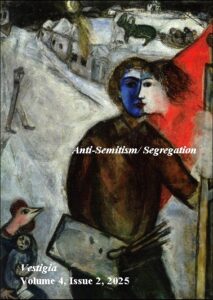ARTICLES
Vestigia, Volume 4, Issue 2, 2025, Pages 19-26
Antisemitism in the twenty-first century: can psychoanalytic theories offer any answers?
Vestigia, Volume 4, Issue 2, 2025, Pages 27-37
Isidor Sadger: a Viennese psychoanalyst killed by the Nazis
Vestigia, Volume 4, Issue 2, 2025, Pages 38-42
Freud, psychoanalysis and anti-Semitism
Vestigia, Volume 4, Issue 2, 2025, Pages 54-67
Freud, Jews, and identity politics: reading Moses and Monotheism in 2024
Vestigia, Volume 4, Issue 2, 2025, Pages 68-84
Vestigia, Volume 4, Issue 2, 2025, Pages 85-90
TEXTS & STUDIES
Vestigia, Volume 4, Issue 2, 2025, Pages 91-99
Vestigia, Volume 4, Issue 2, 2025, Pages 143-157
Vestigia, Volume 4, Issue 2, 2025, Pages 158-178
POEMS
BOOK REVIEWS & SHORT NOTICES
Contemporary Psychoanalysis and Jewish Thought: Answering a Question with More Questions. Edited by Libby Henik and Lewis Aaron
Antisemitism and Racism: Ethical Challenges for Psychoanalysis. By Stephen Frosh
Critical Theories of Anti-Semitism. By Jonathan Judaken
Anti-Semitism at the Limit: Critical Theory and Psychoanalysis. By Benjamin B. Strosberg
BULLETIN
Vestigia, Volume 4, Issue 2, 2025, Pages 192-297

